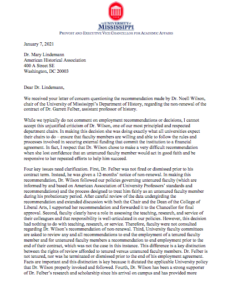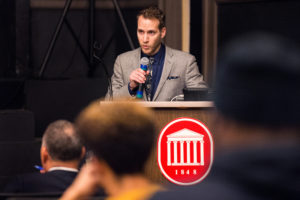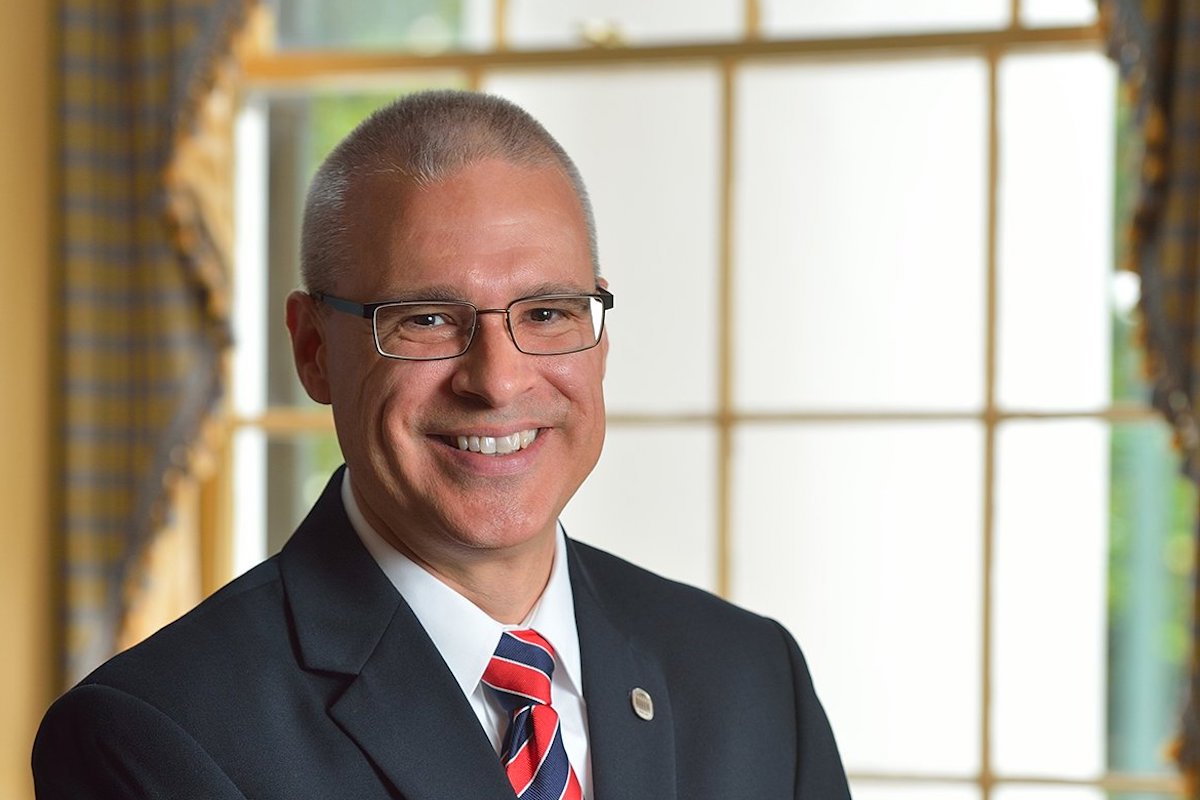The University of Mississippi administration has broken its silence on the firing of Dr. Garrett Felber, a professor known for his anti-racism and prison-reform work, suggesting that the national outcry within academia against the termination is “tied to the stereotypes of our institution’s past.”
Yesterday the university sent the Mississippi Free Press a Jan. 7, 2021, letter that Provost Noel Wilkin wrote to Dr. Mary Lindemann, distinguished professor of history and former president of the American Historical Association. She had criticized the termination of Felber in a recent open letter to UM Chancellor Glenn Boyce and Wilkin.
“The AHA is concerned about the possibility that Professor Felber’s activism relating to racism and incarceration might have affected a decision on his employment status,” Lindemann wrote in the Dec. 22, 2020, letter. “This would be inappropriate and a violation of either his First Amendment rights or his academic freedom, or both. We are also concerned about questions of procedure governing this disciplinary action.”

In his response, Wilkin defended the department head, emphasizing that Felber, who is on tenure track and currently a fellow at Harvard University’s Hutchins Center for African and African American Research, was not really fired. His appointment there was not renewed, the provost emphasized.

“We received your letter of concern questioning the recommendation made by Dr. Noell Wilson, chair of the University of Mississippi’s Department of History, regarding the non-renewal of the contract of Dr. Garrett Felber, assistant professor of history,” Wilkin wrote.
“Dr. Felber was not fired or dismissed prior to his contract term,” the provost contended. “Instead, he was given a 12-months’ notice of non-renewal. In making this recommendation, Dr. Wilson followed our policies governing untenured faculty (which are informed by and based on American Association of University Professors’ standards and recommendations) and the process designed to treat him fairly as an untenured faculty member during his probationary period.”
This correspondence comes in the wake of outrage among academics over what UM administrators are labeling a notice of non-renewal. Following MFP’s reporting on the termination, hundreds of academics across the country from various disciplines voiced solidarity with Felber, some even boycotting the university due to the matter.
‘You Have Refused to Speak to Me’
The Mississippi Free Press reported on Dec. 15 that Felber was notified on Dec. 10 by his department chair, Dr. Noell Howell Wilson, that his employment as an assistant professor of history at the university would end on Dec. 31, 2021.
“Ordinarily,” Wilson told him in an email, “I would have advised you of the nonrenewal either in person or during a telephone or videoconference. Since October 27, 2020, however, you have refused to speak to me.”
Felber denies this assertion. The conflict over form of communication stems from Dr. Wilson’s rejection of a $42,000 grant Felber was awarded for his program, Study and Struggle, in late October. The history professor tweeted about the rejection on Oct. 28 of last year.

“My chair just *rejected* a $42,000 grant from a major foundation we were awarded to support @study__struggle, a political education project on mass incarceration and immigrant detention, saying it’s a ‘political’ not ‘historical’ project, and could jeopardize department funding,” Felber tweeted.
The past president of the AHA, which is the largest association of professional historians in the world, wrote a public letter to Chancellor Boyce to describe their concerns in detail.
“In the case of Professor Felber, publicly available information raises questions about whether the course of action that led to the termination of his appointment has followed proper due process procedures and has maintained his right to access institutionally based fact-finding and appeal mechanisms,” Lindemann wrote.
In his response to Lindemann, the first time the university has addressed the matter publicly, Provost Wilkin contended that Dr. Felber was not technically fired and that the circumstances of his non-renewal did not warrant the involvement of any other members of UM’s department of history, many of whom have complained that they were not consulted in the decision as is the norm.
“While we typically do not comment on employment recommendations or decisions, I cannot accept this unjustified criticism of Dr. Wilson, one of our most principled and respected department chairs,” Provost Wilkin wrote in the letter.
“In making this decision (Dr. Wilson) was doing exactly what all universities expect their chairs to do—ensure that faculty members are willing and able to follow the rules and processes involved in securing external funding that commit the institution to a financial agreement,” Wilkin wrote. “In fact, I respect that Dr. Wilson chose to make a very difficult recommendation when she lost confidence that an untenured faculty member would act in good faith and be responsive to her repeated efforts to help him succeed.”
Wilkin: Termination Did Not Need Faculty Oversight
One of Felber’s colleagues, Dr. Anne Twitty, described her frustration in a tweet after the anti-racism professor’s situation became public, echoing the concerns of a number of history professors. “We are shocked and horrified by this decision, which was made without consultation with the history faculty,” she wrote.
Dr. Felber’s termination did not require the oversight of a faculty committee, Wilkin responded, because he has not been officially terminated or dismissed prior to the end of his employment date. “Facts are important and this distinction is key because it dictated the applicable University policy that Dr. Wilson properly invoked and followed,” he said.
“Dr. Wilson has been a strong supporter of Dr. Felber’s research and scholarship since his arrival on campus and has provided more funding to him than any other faculty member in her department,” Wilkin added.

“Further, the assumptions as to why this recommendation and decision were made, and the spurious links being made to his topics of research and to other aspects of his well-protected rights to free speech and academic freedom, are baseless and ungrounded in fact. Rather, they seem tied to the stereotypes of our institution’s past.”
AHA Executive Director James Grossman expressed confusion at the contents of Wilkin’s response to the Mississippi Free Press this morning. “I think they’re responding to someone else’s letter,” Grossman said bluntly.
Wilkin wrote in the letter that he could not accept the unjustified criticisms of Dr. Wilson, but the AHA letter never mentions the history department chair by name. Nor does it make any specific reference to Dr. Wilson.
Today, UM Associate Director of Strategic Communications, Rod Guajardo responded to Grossman’s confusion, saying the letter addressed specifically to Dr. Lindemann was actually the same letter delivered to three different associations that had also reached out to UM leadership with their concerns over Felber’s termination. The university did not tailor the letter to specific concerns that the addressees had brought up. Guarjardo did not name the other two.
Grossman of AHA also took issue with Provost Wilkin’s assertion that the AHA was drawing upon assumptions about the university’s racist past as reasoning for Felber’s termination, which the UM official called “stereotypes” in his letter.
The head of AHA disagrees that facts about UM’s racist history are merely stereotypes. Grossman cited UM’s resistance to desegregation and the prominence of Confederate symbols within UM’s culture, saying the racist history is well documented, but again expressed confusion because the AHA letter never mentions anything about UM’s issues with racism, historic or more recent.

In fact, the University of Mississippi was roiled just months ago by Ashton Pittman’s ongoing investigation in the Mississippi Free Press about racist, sexist and homophobic emails between now-former UM School of Journalism and New Media Dean Will Norton and recipients, including a donor he was courting for journalism funding.
One result from that series, to date, is that the university has targeted its own faculty and student ombudsman in an attempt to discover the identity of whistleblowers who received the emails through public-records requests and provided them to this publication, even as Provost Wilkin defended keeping Norton on an $18,000-a-month salary after he stepped down and stopped teaching classes. Norton also saw a national journalism award rescinded as a result of the revelations in the series. The university placed ombudsman Paul Caffera on leave after he sued UM for demanding access to emails from members of the UM community who had reached out to him for help. The university responded to Caffera’s lawsuit, saying the ombudsman is “raising false alarms.”
The Seattle-based International Ombudsman Association is supporting Caffera, saying the university’s decision to target him in the hunt to reveal whistleblowers who provided the racist emails could have a “chilling effect” on the profession nationwide.
Dr. Felber on ‘Confidential’ Problem: ‘I Have No Idea What That Is’
Wilson’s primary written concern when she notified Felber that he was not being asked to remain in the department was that he had declined to talk with her in recent months, opting instead to communicate in writing after their disagreement over the grant funds.
“Respectfully, your effort to dictate or restrict the means by which I communicate with you is untenable. Your repeated refusal to talk with me makes it impossible for me to maintain a productive working relationship with you or supervise your faculty responsibilities,” Dr. Wilson wrote in her termination letter to Felber on Dec. 10.
Wilson, who earlier declined to speak to the Mississippi Free Press about Felber, did not state that this was the reason for termination, but intimated as much when she provided a bulleted list of times she was dissatisfied with Felber’s communication in his termination notice.

While Wilson stated that Felber sought to dictate the means by which she could communicate with him, many of his defenders signed off on a letter that defended how he chose to respond to her.
“It seems only reasonable for Professor Felber to have requested that any discussion with his Chair about the withdrawal of support for his grant be in writing,” the open letter, signed by many well-known academics, states.
The Mississippi Free Press reached out to Felber yesterday, who was confused by Wilkin’s insinuation in the letter UM provided to this publication that there might be a “confidential” personnel issue that perhaps he could not address.
“Frankly, I am surprised at your willingness to call into question the credibility of another accomplished scholar and historian without considering the applicable University policy, without knowing the applicable facts, and failing to appreciate that there may be other relevant data that cannot be broadly shared due to the confidential nature of personnel issues,” Provost Wilkin wrote while not explicitly stating that there is such an issue with Felber.
The “confidential” statement surprised Felber yesterday. “I have no idea what that is. Presumably I would be made aware of that if it were the case,” he told the Mississippi Free Press.






